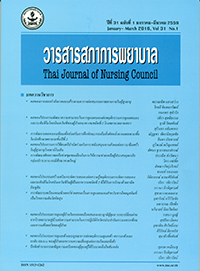ปัจจัยทำนายการเผชิญความเครียดของผู้ดูแลผู้ได้รับบาดเจ็บไขสันหลัง
Keywords:
การเผชิญความเครียด, ผู้ได้รับบาดเจ็บไขสันหลัง, ผู้ดูแล, stress-coping, caregivers, spinal cord injury patientsAbstract
บทคัดย่อ: วัตถุประสงค์ของการวิจัย: ศึกษาปัจจัยทำนายการเผชิญความเครียดของผู้ดูแล ผู้ได้รับบาดเจ็บไขสันหลัง โดยใช้กรอบทฤษฏีการเผชิญความเครียดของลาซารัสและโฟล์คแมน
การออกแบบงานวิจัย: การวิจัยเชิงทำนาย
การดำเนินการวิจัย: กลุ่มตัวอย่างจำนวน 82 รายเป็นผู้ดูแลหลักในการดูแลผู้ได้รับ บาดเจ็บไขสันหลังที่มารับการรักษาแผนกผู้ป่วยนอก แผนกเวชกรรมฟื้นฟู และแผนกเวชกรรม สังคม โรงพยาบาลประจวบคีรีขันธ์ เครื่องมือที่ใช้ในการวิจัย ได้แก่ แบบประเมินการรับรู้สมรรถนะ แห่งตน การรับรู้ภาวะสุขภาพ สัมพันธภาพในครอบครัว การสนับสนุนทางสังคมจากบุคลากร ทางสุขภาพ และการเผชิญความเครียด วิเคราะห์ข้อมูลโดยใช้สถิติถดถอยพหุคูณ
ผลการวิจัย: กลุ่มตัวอย่างใช้การเผชิญความเครียดทั้งวิธีมุ่งแก้ปัญหาและการจัดการ กับอารมณ์ โดยใช้วิธีมุ่งแก้ปัญหามากกว่าการจัดการกับอารมณ์ การสนับสนุนทางสังคมจาก บุคลากรทางสุขภาพ สามารถทำนายการเผชิญความเครียดโดยรวมของกลุ่มตัวอย่างได้ ร้อยละ 28 (R2 = .28, p < .001) การสนับสนุนทางสังคมจากบุคลากรทางสุขภาพและ สัมพันธภาพในครอบครัว สามารถร่วมกันทำนายการเผชิญความเครียดแบบมุ่งแก้ปัญหา ของกลุ่มตัวอย่างได้ร้อยละ 42 (R2 = .42, p < .001) การสนับสนุนทางสังคมจากบุคลากรทาง สุขภาพและการรับรู้ภาวะสุขภาพ สามารถร่วมกันทำนายการเผชิญความเครียดแบบการจัดการ กับอารมณ์ของกลุ่มตัวอย่างได้ร้อยละ 18 (R2 = .18. p <.01) ส่วนการรับรู้สมรรถนะแห่งตน ไม่สามารถทำนายการเผชิญความเครียดได้
ข้อเสนอแนะ: พยาบาลและบุคลากรทางสุขภาพควรส่งเสริมการเผชิญความเครียด ของผู้ดูแลผู้ได้ รับบาดเจ็บไขสันหลังโดยการให้ข้อมูลเกี่ยวกับการดูแล และแสวงหาแหล่ง สนับสนุนอย่างเหมาะสม เพื่อให้เกิดความพร้อมในการดูแล พัฒนาระบบการพยาบาลใน การนำครอบครัวเข้ามามีส่วนร่วมในการดูแล รวมทั้งส่งเสริมภาวะสุขภาพของผู้ดูแล เพื่อเพิ่ม ความสามารถในการเผชิญความเครียดของผู้ดูแลผู้ได้รับบาดเจ็บไขสันหลังได้อย่างเหมาะสม
Abstract: Objective: To study factors that could predict the stress-coping ability of
caregivers of spinal cord injury patients, based on Lazarus & Folkman’s (1984)
stress-coping framework.
Design: Predictive research.
Implementation: This study was conducted on a sample of 82 main caregivers of
spinal cord injury patients being treated at the Out-Patient Department, the Rehabilitative
Medicine Department and the Social Medical Service Department of Prajuabkhirikhan
Hospital. The research instrument was a form used to collect data on (1) a self-efficacy
evaluation; (2) health perception; (3) family relationship; (4) social support by healthcare
personnel; and (5) stress-coping strategies. The data were analysed using multiple
regression statistics.
Results: The stress-coping strategies adopted by the majority of the subjects
were problem-solving attempts and emotion management, with the former being preferred
over the latter. Social support by healthcare personnel was a factor that could predict
the overall stress-coping ability in 28% (R2 = .28, p < .001) of the subjects and, when
combined with the factor of family relationship, could predict problem-solving as a
stress-coping strategy in 42% (R2 = .42, p < .001) of the subjects. In addition, social
support by healthcare personnel and health perception could predict emotion management
as a stress-coping strategy in 18% (R2 = .18, p < .01) of the subjects. Self-efficacy
perception, on the other hand, was incapable of predicting stress-coping ability.
Recommendations: It is recommended that nurses and healthcare personnel
provide caregivers of spinal cord injury patients with adequate caring information and
help them seek a proper source of support. This could enhance the caregivers’ readiness,
strengthen the family-engaged caring system and improve the caregivers’ health by
equipping them with proper stress-coping strategies.
Downloads
References
National Spinal Cord Injury Statistical Center. Spinal
cord injury facts and figure at a glance.USA Author;
Medical records department. Prachuap Khiri Khan
Hospital. Statistics spinal cord injury. Prachuap
Khiri Khan Hospital;2011. (In Thai).
Gardner BP, Kluger PJ. The Overall Care of spinal
cord injuried Current Orthopedics;2004.
Ragsdal D, Yarbough S, Lasher AT. Using social
support theory to care for CVA patients. Rehab
Nurs 2014;18(3):154-61.
Lazarus RS, Folkman S. Stress, appraisal, and coping.
New York: Springer;1984.
Nitaya S. Relationship between family coping
behavior and confidence in dependent care of stroke
patients. [Master of Nursing Sciences Thesis].
Bangkok: Mahidol University;1998. (In Thai).
Wipada K, Nongkran V, Puttraporn T. Role stress/
strain, coping and factors predicting health status of
nurse. Faculty of Nursing, Chiang Mai University;
(In Thai).
Kanchana S. The relationship between family
relationship, hope and adaptation in hemiplegic
patients. [Master of Nursing Sciences Thesis].
Bangkok: Mahidol University;1998. (In Thai).
Muenphun M. The relations between demography,
uncertainty in illness and health authority support,
with coping of family critically ill patients in
Pramongkutklao hospital. [Master of Nursing
Sciences Thesis]. Bangkok:Mahidol University;
(In Thai).
Tabachnic BG, Fidell LS. Using Multivariate Statistic.
Boston: Allyn and Bacon;1996.
Wilai S. Coping and predicting factors of stress in
family caregivers of paralytic patients. [Master of
Nursing Sciences Thesis]. Nakhonpathom: Christian
University;2006. (In Thai).
Bendura A, Self – Efficacy : The Exercise of Control.
New York: W .H. Freeman;1997.
Ware JE, Sherbourn CD. The Mos 36 - item short
from health survey (SF -36) Medical Care 1992;
(6):437-83.
Crandall RC. Gerontology: A Behavioral Science
Approach. Massachusetts: Addison- Wesley; 1980.
Wannarat L, Rachanee S, Yuvadee R. Evidences
and Needs of Family Caregiver with Chronically III
Adults. Journal of Phapokklao Nursing College
;15(2):17-31. (In Thai).
Somjit H. Nursing Care in Stroke Patient. In:
Hanucharoenkul S, editors. Nursing and Medicine
th. Bangkok:V.J. Printing;1995. (In Thai).
Pornchai J, Yupin T. stress and coping of caregivers
of stroke patients. The Journal of Faculty of Nursing
Burapha University 2001; 9(1):32-45. (In Thai).








